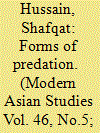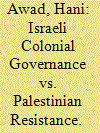| Srl | Item |
| 1 |
ID:
118911


|
|
|
|
|
| Publication |
2012.
|
| Summary/Abstract |
In this paper I compare late nineteenth and early twentieth-century sport hunting of markhor, a mountain goat, by British civil and military officials in the mountainous northern frontier region of Kashmir State, with their hunting of tigers, particularly man-eating tigers in the hilly and plains regions of India. Using these two instances, this paper elucidates and compares two competing visions of colonial governance. The British sportsman hunted man-eating tigers in order to protect Indian society from wild nature. Hunting them was also symbolic of their welfare-oriented governance ideology. They also hunted markhor in the northern mountainous region using begar, or forced labour, which they justified by falling back on the wider colonial representation of the northern mountainous region as a civilization-less area, where a more coercive form of governance was needed. So, rather than protecting society from nature, as in the case of man-eating tiger hunting in the plains, what was needed in the mountains was the ability of the British to introduce civilization into unruly nature via a strong disciplinary force. I argue that colonial governance entailed not simply a struggle to civilize India and its population, but a more profound struggle for control over nature.
|
|
|
|
|
|
|
|
|
|
|
|
|
|
|
|
| 2 |
ID:
192248


|
|
|
|
|
| Summary/Abstract |
This article examines the institutional genealogy of Israeli colonial governance (ICG) and the accompanying patterns of Palestinian resistance in the occupied West Bank and Gaza Strip. It argues that ICG has experienced three phases, each marked by a particular form of direct or indirect colonial rule. Each of these colonial rule forms has been resisted through a distinct pattern of centralized or decentralized collective political agency. I argue that both the form and governing logic of ICG are determined not only by colonialist aims, but also by their interplay with the Palestinian resistance.
|
|
|
|
|
|
|
|
|
|
|
|
|
|
|
|
| 3 |
ID:
181199


|
|
|
|
|
| Summary/Abstract |
The centralization of conflict resolution and the administration of justice, two crucial elements of state formation, are often ignored by the state-building literature. This article studies the monopolization of justice administration, using the historical example of the General Indian Court (GIC) of colonial Mexico. The author argues that this court’s development and decision-making process can show us how the rule of law develops in highly authoritarian contexts. Centralized courts could be used strategically to solve an agency problem, limiting local elites’ power and monitoring state agents. To curb these actors’ power, the Spanish Crown allowed the indigenous population to raise claims and access property rights. But this access remained limited and subject to the Crown’s strategic considerations. The author’s theory predicts that a favorable ruling for the indigenous population was more likely in cases that threatened to increase local elites’ power. This article shows the conditions under which the rule of law can emerge in a context where a powerful ruler is interested in imposing limits on local powers—and on their potential predation of the general population. It also highlights the endogenous factors behind the creation of colonial institutions and the importance of judicial systems in colonial governance.
|
|
|
|
|
|
|
|
|
|
|
|
|
|
|
|
| 4 |
ID:
120443


|
|
|
|
|
| Publication |
2013.
|
| Summary/Abstract |
Questions of race and racism have haunted the imagination of international relations (IR) since its inception. The essays in this special section probe assorted dimensions of the story, elucidating important though often overlooked ways in which racial difference is figured in global politics.
|
|
|
|
|
|
|
|
|
|
|
|
|
|
|
|